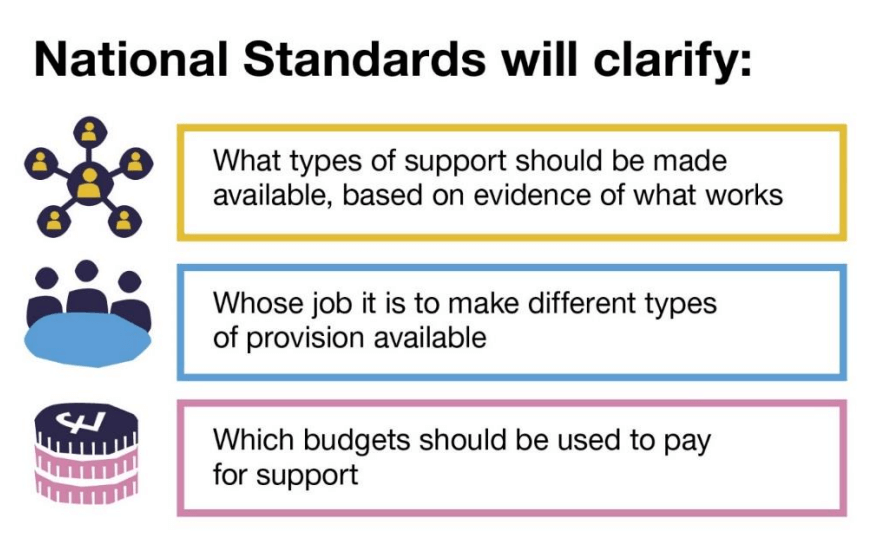The DfE published the ‘SEND and Alternative Provision Improvement Plan’ on Thursday 2nd March 2023. This follows on from the SEND and Alternative Provision green paper that was published last year and the consultation that followed.
All parties agree that there is a need to overhaul the current provision and support for pupils with SEND, but there has been great debate over how to best achieve this. This plan is the government’s road map for the future, in which it outlines the following ambition:
Our vision is to create a more inclusive society that celebrates and enables success in all forms, with the cultures, attitudes and environments to offer every child and young person the support that they need to participate fully, thrive and fulfil their potential.
I wholeheartedly agree with the tag line ‘Right Support, Right Place, Right Time.’ But in the current system, it is often extremely challenging to achieve this for many of our pupils despite our best efforts.
There are five main strands to the document and I will look at these briefly, whilst highlighting what I think are the key points within each.
1. A national system underpinned by National Standards
The Department for Education (DfE) plans to engage parents, carers, children and young people, and associated professionals to help develop new national standards. Some of these elements will then be tested, beginning later this year. A ‘significant proportion’ of the National standards will be published by the end of 2025. These standards will then be used to create local inclusion plans and promote best practice.

There is additional investment to fund new places and improve existing provision, whilst also developing alternative approaches to short breaks.
Whilst we must wait and see how these standards and funding are developed and rolled out, the area that will have the most impact for working SENDCos will be the changes to the EHCP system. Currently each authority asking for different paperwork can make an already arduous task even more so. The plan outlines that it will look to develop a standard, digitised EHCP template, with supporting processes and guidance. Unfortunately, this does not look as if it will be a quick process as it states ‘from 2025.’
2. Successful transitions and preparation for adulthood
The vision is for all children and young people to successfully move through education and into adulthood. It acknowledges that not all children and young people will require EHCPs and that there are many routes through to adulthood, including employment and adult services.
There is promised investment to double the capacity of supported internships and improve the Disabled Students’ Allowance process.
3. A skilled workforce and excellent leadership
The key changes here are to review Initial Teacher Training, to introduce a new leadership level SENCo NPQ and to fund up to 5000 Early Years staff to gain a Level 3 early years SENCo.
This is an area I feel passionately about. During my PGCE, I received just two hours training on SEND. After talking to colleagues, I realise this is more than many of them received. As more and more pupils with SEND are staying within mainstream classrooms, the importance of this cannot be underestimated.
I believe in the NASENDCo, it is a Level 7 award that offers staff the time and skills to develop their practice unlike other courses. I believe that the two courses could run alongside each other.
Currently all SENDCos must achieve the award within 3 years of employment. The new award would be mandatory for ALL staff working as a SENDCo who have not achieved the award, including those who started prior to September 2009 (these staff were previously exempt from completing the NASENDCo). There are no details regarding timing for this at present and the Code of Practice will need amending to remove the requirement to complete the NASENDCo.
There are further plans to increase the capacity of specialists, including funding to train more Educational Psychologists and increase access to Speech and Language Therapy for those that need it. This would be welcomed by all staff in schools as there is such a large unmet need at present.
The improvement plan also talks of developing a longer-term approach for teaching assistants to ensure their impact is consistent across the system, starting with a research project to develop the evidence base on current school approaches, demand and best practice. There has been a lot of research in this area recently from the Education Endowment Foundation (EEF) and it will be interesting to see how these projects work alongside each other. Teaching assistants are such a crucial part of the workforce and I believe the majority would welcome further training to help them deliver the best support. However, this needs to be achieved without increasing their workload further, whilst providing the appropriate funding and time.
4. Strengthened accountabilities and clear routes of redress
There are plans to publish a local and national inclusion dashboard which can be used to inform decision-making and drive self-improvement across the system. Additionally, the government plans to update Ofsted and Care Quality Area SEND inspections. These plans are expected to be put in place this year, whereas many of the other proposals to enhance provision are not planned until 2025. I believe this may lead to an unfair representation of the work being done ‘on the ground’ by many hardworking professionals.
5. A financially sustainable system delivering improved outcomes
There are plans to increase core school funding, whilst developing a system of funding bands and tariffs so that consistent National Standards are backed by more consistent funding across the country. The government also plans to develop new approaches to funding Alternative Provision and re-examine the state’s relationship with independent special schools to ensure there are comparable expectations for all state-funded specialist providers.
Undoubtedly, more funding is needed across the board, not only within the education sector but also within health. This will enable each of us to support all the children and young people that we work with and respond effectively to the challenges they face across the four areas of need.
In conclusion, there are many solid solutions in this paper that we as professionals on the ground have been asking for over the course of many years, including a standardised EHCP system, improved access to professions (SaLT, EP, CAMHS) and increased funding to help pupils earlier with more targeted support. We all look forward to achieving progress and creating a more inclusive system. Time will tell if this is the plan that will deliver it.
For further support, please get in touch with our SEND team. Our experts can provide bespoke support and high-quality training, equipping your staff with the skills they need to deliver the best possible outcomes for pupils with SEND.












